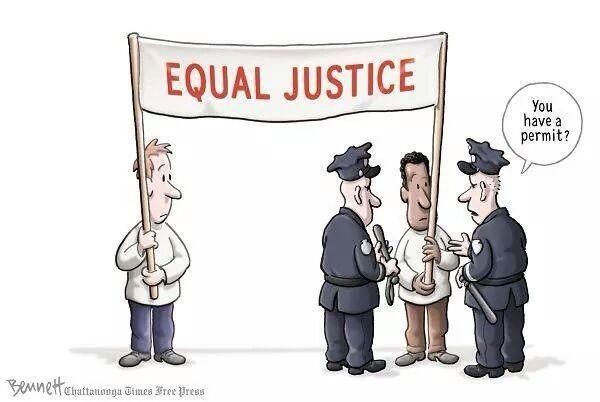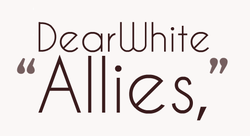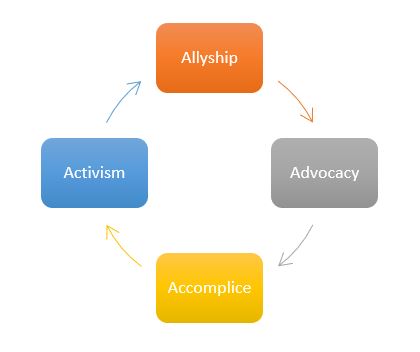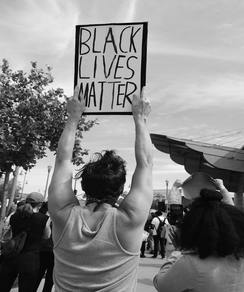I had to acknowledge that I and many of my well intentioned white friends did not have vocabulary to talk about racism in an everyday kind of way. We were frequently mired in feelings of guilt. When we encountered racism, we could not be counted on to speak up and confront it. Too often, we fell mute, became confused, reacted with defensiveness, or simply wanted to disappear. I could see that I was not trustworthy, especially when things got hot.
— Melanie S. Morrison (2013)
In January of this year, we engaged in a conversation about allyship and the nuances of what it means. There are many that consider themselves egalitarian, that there should be racial equity, see themselves as allies, yet many of the same individuals that perceive themselves as an ally fail to act. It was this point Zamani-Gallaher argued saying, “Allies are nice, but accomplices are needed as an ally is the equivalent of theory not practice, as well as talk and no walk.” I then began to understand her desire to want an accomplice vs. an ally at her side…at OUR side. We’d rather have a person with a proven track record of standing up for racial justice alongside us, who isn’t just self-interested but has cooperative group interests. We'd rather have a person who does not opt-in and opt-out of the struggle because it is uncomfortable, because they are fatigued, because they may get arrested, and/or because they are fearful of what others think or will do if they are aware of their white privilege. We’d rather a person who will work in an unapologetic, open way to dismantle white supremacy.
 Black people have these fears daily, and whenever we see law enforcement officers. Allies can be wish-washy where they weigh all their options while our Black lives are in constant danger. Allies fear losing friendships, their families disowning them, being terminated from their jobs, and the list goes on and on. The fact that we each have had people who consider themselves social justice oriented and allies of racially minoritized folks but don’t think there is structural racism or check their family and friends that are bigots is a problem. They instead opt-out of fighting to challenge racism in their homes, churches, communities, schools, and fail woefully to fight against a system that does not value Black lives. For us, this is not corrective, this is not conviction, this is merely cowardice. By contrast, accomplices may have similar contexts, but they are not passivists, whereas some allies are. The distinction between allies and accomplices is that the former fails to act whereas the latter take action steps. Accomplices care more about dismantling the systemic issues harming Black lives, no matter what.
Black people have these fears daily, and whenever we see law enforcement officers. Allies can be wish-washy where they weigh all their options while our Black lives are in constant danger. Allies fear losing friendships, their families disowning them, being terminated from their jobs, and the list goes on and on. The fact that we each have had people who consider themselves social justice oriented and allies of racially minoritized folks but don’t think there is structural racism or check their family and friends that are bigots is a problem. They instead opt-out of fighting to challenge racism in their homes, churches, communities, schools, and fail woefully to fight against a system that does not value Black lives. For us, this is not corrective, this is not conviction, this is merely cowardice. By contrast, accomplices may have similar contexts, but they are not passivists, whereas some allies are. The distinction between allies and accomplices is that the former fails to act whereas the latter take action steps. Accomplices care more about dismantling the systemic issues harming Black lives, no matter what.
 We’re not saying allies aren't welcomed, but we are saying put your money where your mouth is! We need accomplices that are critically conscious and have a firm understanding of their privilege and power to deconstruct white supremacy and dismantle systemic racism. Once white America recognizes this, don’t take this newfound ‘wokeness’ to whitesplain or play out white savior (e.g., bypass us with your iteration of Hillary Swank’s character from Freedom Writers or Michelle Pfeffer’s in Dangerous Minds).
We’re not saying allies aren't welcomed, but we are saying put your money where your mouth is! We need accomplices that are critically conscious and have a firm understanding of their privilege and power to deconstruct white supremacy and dismantle systemic racism. Once white America recognizes this, don’t take this newfound ‘wokeness’ to whitesplain or play out white savior (e.g., bypass us with your iteration of Hillary Swank’s character from Freedom Writers or Michelle Pfeffer’s in Dangerous Minds).
As we are in the third week of countrywide civil unrest and global protesting of Black Lives Matter and anti-racism, there has been a multitude of colonizing acts exposed. When engaging in activist work, we do not need allies who are going to come in and tell us [Black people] what we need to be doing or how this should go down. This is counterproductive and only serves to reinforce white cultural hegemony. One PSA we can share is white allies attempting to direct Black people in the fight for Black liberation is just more layering of oppressive acts, are a violation, doesn’t resemble our truths, and is far from reconciliatory. Often, we have seen too many white “allies” engage in this fight for appearances not to make substantive change. They are ‘with us’ simply for social media likes, what they see trending in the news, or as an opportunity to publish or self-promote while at the same time failing to cite scholars of color who have long done the work without recognition. So, unfortunately, it is allyship that is motivated by inauthentic ethos of care that is disingenuous and fair weathered.
Georges, Jr.: My conversations with Dr. ZG, along with others, and the literature made me rethink what being an ally truly meant. Before enrolling at the University of Illinois at Urbana-Champaign, I thought the goal was for white people and other racially minoritized folks to become allies of Black people in the fight for racial justice. However, when thinking about how these “allies” can still cause harm through their well-intended actions or the need to be a “savior” of some sort – I began to question peoples’ motives and intentions.
At the beginning of the spring 2020 term, we delivered a workshop and provided training for community college student leaders from all of the Illinois community colleges. This workshop focused on the differences between allies and accomplices in advocacy of equity. During this presentation, we introduced the Aspiring Ally Identity Development Model as adopted from Edwards (2006) to aid student leaders, the vast majority of which were white collegians. This gave us an opportunity to unpack, interrogate, and problematize what it meant to be in allyship with underserved, marginalized, and racially minoritized communities.
Aspiring Ally Identity Development Model (Edwards, 2006)
Aspiring Ally for Self Interest - There is a need to protect those they care about from being hurt. This is with an individual that they have a personal connection with, rather than a group or an issue.
Aspiring Ally for Altruism - Awareness of privilege begins to develop, and a person in this role seeks to engage in ally behavior as a means of dealing with guilt.
Aspiring Ally for Social Justice - People who work with those from the oppressed group in collaboration and partnership to end the system of oppression.
 During the workshop, we called the students to consider intersecting identities and how someone can choose to be an ally for one identity group (e.g., race, gender, etc.) while completely divorcing themselves from other groups (e.g., LGBTQIA+, religious minorities, etc.). Accomplices do not engage in actions like those that are similar to the oppressor. Accomplices are all in, no matter the circumstances or social identities – they respect and are sensitive to cultural differences and understand the need for collective action. Accomplices are our “ride or dies.”
During the workshop, we called the students to consider intersecting identities and how someone can choose to be an ally for one identity group (e.g., race, gender, etc.) while completely divorcing themselves from other groups (e.g., LGBTQIA+, religious minorities, etc.). Accomplices do not engage in actions like those that are similar to the oppressor. Accomplices are all in, no matter the circumstances or social identities – they respect and are sensitive to cultural differences and understand the need for collective action. Accomplices are our “ride or dies.”
According to the Indigenous Action Media, “accomplices are realized through mutual consent and build trust. They don’t just have our backs, they are at our side, or in their own spaces confronting and unsettling colonialism. As accomplices we are compelled to become accountable and responsible to each other, that is the nature of trust” (2014, p. 8).
This Thursday, we are speaking “Truth to Power” in sharing it is the responsibility of everyone to dismantle the structures of American racism and that systemic racism has been a perennial act of terror for Black people since 1619. In telling the truth, that means we lift the veil on the contractions and lack of conviction, the paradoxes and peril of having ‘friends only on furlough on racial justice matters’ which equate to allies missing in action. In short, we need accomplices, not allies!!! It’s past time…IT IS TIME FOR SOME ACTION.
References
Edwards, K. E. (2006). Aspiring social justice ally identity development: A conceptual model. NASPA Journal, 43(4), 39-60.
Indigenous Action Media. (2014). Accomplices not allies: Abolishing the ally industrial complex.
McGirt, E. (2020, June 9). Dear white people: Our nation turns its racist eyes on you. Fortune Magazine.
Morrison, M. S. (2013). Becoming trustworthy white allies. The Future of Race. MA: Yale Divinity School.
Other Resources
AntiRacism: An Artist, Educator, Author and Dean Reflect on What It Means to Be an Ally
Dear White People: Being an Ally Isn't Always What You Think
Guidelines for Being Strong White Allies - Racial Equity Tools
How Can White People Be Better Allies To People Of Color?
How to Be Real: Allies, Accomplices, & Anti-Oppression
Patton, L. D., & Haynes, C. (2020). Dear white people: Reimagining whiteness in the struggle for racial equity. Change: The Magazine of Higher Learning, 52(2), 41-45.
Transnational Whitelash in Educational Policy and Practice
White Shame: How to Convert Guilt into Action
This blog post is the fourth in OCCRL's "Truth Thursdays" series, which examines the impact of race, racial inequity, and calls for racial justice. Read the first blog "Truth Hurts" by Dr. Eboni M. Zamani-Gallaher, the second blog by Dr. Marci Rockey, "Educational Governing Boards and Structural Racism" and the third blog in the series “Black Student Activists and the Fight for Racial Justice” by Colvin T. Georges Jr.




Leave a comment